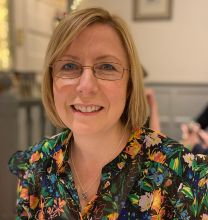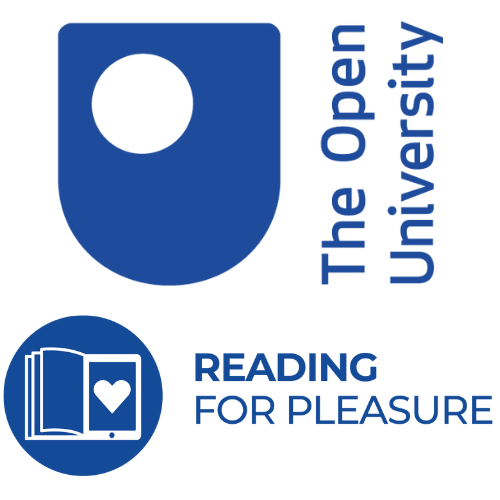Developing a Culture of Reading for Pleasure 1: Teachers who Read and Readers who Teach
18 August, 2023 Debbie Thomas is a Lecturer in Reading for Pleasure at the Open University, working to develop RfP pedagogy and research in schools across the country. She has also been a Regional Associate for The Centre for Literacy in Primary Education and has previously worked as a local authority English advisor, a primary teacher, leader and inspector in a variety of different settings.
Debbie Thomas is a Lecturer in Reading for Pleasure at the Open University, working to develop RfP pedagogy and research in schools across the country. She has also been a Regional Associate for The Centre for Literacy in Primary Education and has previously worked as a local authority English advisor, a primary teacher, leader and inspector in a variety of different settings.
Over the course of four blogs for Literacy Hive, Debbie will share the latest research and explore the key elements that underpin the development of a Reading for Pleasure culture in schools, starting with the importance of teachers’ own knowledge of children’s literature and other texts.
Reading for pleasure vs reading proficiency
A significant body of research now tells us that Reading for Pleasure is one of the single most important factors in educational success for our children (OECD, 2002). But this presents a challenge for teachers – how do we implement a Reading for Pleasure ethos and provision in a system that demands accountability and reading proficiency?
It helps to consider the research into Reading for Pleasure. The seminal study on Reading for Pleasure in the UK was conducted in 2014, through the Teachers as Readers research by Teresa Cremin et. al. This study concluded that to develop children’s RfP effectively, teachers need to develop:
- Considerable knowledge of children’s literature and other texts
- Knowledge of children as readers
- A RfP pedagogy:
- social reading environments
- reading aloud
- informal book talk, inside-text talk and recommendations
- independent reading time
- As Reading Teachers – teachers who read and readers who teach
- As Reading Teachers – teachers who read and readers who teach
- Reciprocal and interactive reading communities
(Cremin et al., 2014)
Ongoing research continues to support these findings.
Taking the first steps on the Reading for Pleasure journey
The Teachers as Readers research highlighted that, too often, teachers’ knowledge of children’s literature is limited to a few well-known authors or those authors that we encountered at school or with our own families. However, if we are to support the many different reading needs and interests of pupils in our classrooms today, our book knowledge needs to encompass a wide range and diversity of texts. Developing our knowledge of children’s literature is therefore a critical first step in our journey to embed a culture of Reading for Pleasure in our schools and classrooms.
Help is at hand…
Widening our own book knowledge can seem like an insurmountable task but the good news is that the opportunities for the teaching profession to engage with children’s literature are greater than I have ever known. Authors have never been more accessible – through author visits, literature festivals, or even engaging directly with teachers and their classes on Facebook and Twitter. Book Awards celebrate the best in children’s publishing each year. With awards to cover every genre – from poetry to non-fiction – their shortlists are a useful source of recommendation for schools and individuals looking to discover the latest titles. There are also numerous websites and blogs that provide book reviews and booklists to help us navigate our way through the 1000s of new titles published every year.
This year, why not set yourself a personal reading challenge? Or work with colleagues to develop your collective book knowledge – it can certainly help to have the support of others! Find examples of practice to help and inspire you here.
Becoming a Reading Teacher
Book awards and book review sites are all important resources to tap into to help you develop your knowledge of children’s literature. However, the Teachers as Readers research highlighted that it is not just teacher knowledge of the latest titles that matters. It is also important for teachers to understand their own experiences of reading, to reflect on what it means to them to be a reader and how this can impact on their pupils’ experience of reading. Creating space and time for teachers to develop this understanding – to become ‘Reading Teachers’ – is another key step in the Reading for Pleasure journey.
Teachers’ Reading Groups
It is always a challenge to fit new commitments into an already busy schedule, which is why the Open University, in collaboration with the UKLA, set up the OU/UKLA Teachers’ Reading Groups (TRGs).
TRGs provide the time for teachers to reflect on their own knowledge and practices; the space to create a development plan for an area of their work in RfP; the opportunity to build a supportive professional community around RfP both locally and online; and a place to share the results of their development work via the OU RfP website. In just five sessions across an academic year, members will develop their knowledge of high-quality children’s literature and be supported as ‘Reading Teachers’.
TRGs include a range of education professionals: teaching assistants, librarians, head teachers, reading volunteers, as well as teachers and literacy leads. Since 2017, over 100 groups have been established across the UK and internationally. There is still time to join the growing community of Reading Teachers for this academic year so why not visit the OU Reading for Pleasure website to find a group local to you?
Further resources
Interested in learning more about the latest RfP research? The new Reading Teachers: Nurturing Reading for Pleasure book combines the latest academic insights with practical case studies. Or join us at one of our OU Reading for Pleasure conferences for a day of engaging talks and evidence-based workshops led by expert practitioners. Details of the next conference in March will be released soon. See you there!
First published in September 2022. Reviewed and updated August 2023.

